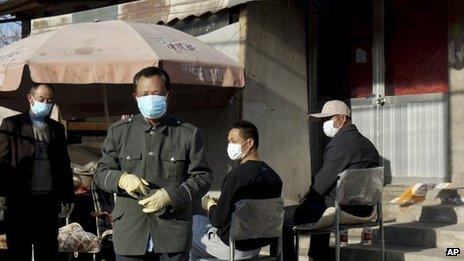China bird flu: Reported H7N9 cases rise to 60
- Published

China has reported 11 fresh cases of bird flu, with the virus now appearing in the central province of Henan and the capital Beijing.
The new cases of the H7N9 strain bring the total number of reported cases to 60. Two more people have now died.
Authorities believe the virus is being spread through direct contact with infected poultry.
The World Health Organisation (WHO) said there was no evidence yet of human-to-human transmission.
Michael O'Leary, the WHO's representative in China, said cases did not appear to be connected.
"There's no way to predict how it will spread but it's not surprising if we have new cases in different places like we do in Beijing," he told reporters.
On Saturday a seven-year-old girl became Beijing's first confirmed case of the H7N9 strain.
Two cases were reported in the central Henan province, while the others were seen in and around Shanghai, where the virus first appeared in February.
Two new deaths announced on Sunday were also in Shanghai, bringing the total number of dead to 13.
There are no reported cases outside the country, according to the WHO.
Nineteen people who had close contact with the two new victims in Henan had shown no signs of infection, China's state news agency Xinhua said.
International health experts have commended China on its transparency in reporting the spread of the virus, in sharp contrast to its handling of a Severe Acute Respiratory Syndrome (Sars) outbreak in 2003, when 8,096 people were infected worldwide and 744 died.
- Published12 April 2013
- Published6 April 2013
- Published6 April 2013